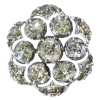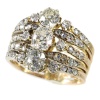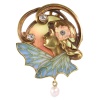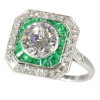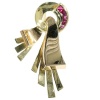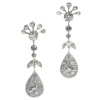Nous offrons des facilités de paiement pour le bijou de vos rêves. Demandez nous les détails. Expédition assuré gratuite !
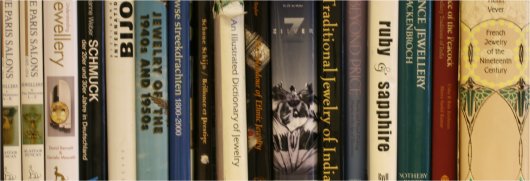
Antique jewelry glossary
Welcome to our extensive antique jewelry glossary with around 1,500 jewelry related entries.If you feel you are missing an explanation, feel free to let us know and we will add it.
A - B - C - D - E - F - G - H - I - J - K - L - M - N - O - P - Q - R - S - T - U - V - W - X - Y - Z all
Cupellation or fire assay
Cupellation is a process used to separate noble metals such as gold or silver from base metals such as lead. It is often used to assay gold in order to test its purity. Sometimes cupellation is called "fire assaying." It was formerly the usual process for extracting silver from lead.
In this process, an alloy consisting of both noble and base metals is placed in a crucible. This mixture is then melted and allowed to freeze. When solidified, a button consisting of precious metals and lead can be removed from the slag of metal oxides and other materials. When assaying ores this slag layer can be quite massive, but when assaying karat gold, it is virtually non-existent. After cooling, the metals are placed in a special pot made of bone ash or clay called a cupel. Under high heat, lead turns to litharge, a lead oxide, which is absorbed by the cupel or lost to the atmosphere. At the end of the cupellation process, a button of pure gold and silver remains in the bottom of the cupel. The button is then placed in nitric acid to dissolve the silver, and the remaining pure (24k) gold weighed to determine the gold content present in the original starting material.
Loss of lead to the larger atmosphere creates an environmental hazard, and so this larger loss should be restrained by appropriate equipment and lead recovery means.
Historically, cupellation was not merely a method of assaying, but also the main means of extracting silver from lead. It produced litharge in large quantities which was usually resmelted to lead.
From: Wikipedia



